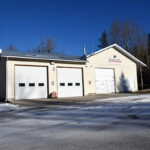Home »

Readers will like Sidetracked
Book Review
By Derryll White
Mankell, Henning (1995). ‘Sidetracked’
What makes Mankell interesting to me is his unwavering analysis of Swedish society. He is hard because he cares, because he senses the known world of democratic state socialism slipping away. He does not hesitate to point out the effects on society of decreased funding to the judiciary, the unwavering pressures of the business class for structural change. In Canada we take these things as the way life now is with Harper. In Sweden the people I talk to in Ystad pay attention to Mankell. Most working people are mad that Swedish social values are eroding, that politicians are caving to the pressures of the market place.
Kurt Wallender is most effective at introspection. Mankell slows events down with Wallender’s reflections – on the current case, on Swedish society, on old age. He uses Wallender’s prodigious mental talents to probe what he, Mankell, sees as the collapse and disintegration of the state. It is what makes him different as an author, the constant rejection of the status quo as simply not good enough. We need minds like his in Canada, examining the increasing grip the Prime Minister’s Office is placing on our own policing and social security net.
Mankell is very clear in this novel that Sweden does not exist inviolate, alone. Traffic in illegal goods and people flow through Sweden’s ports. People come and go. This was forcefully brought home to me when the baker serving me coffee said “Where in Canada do you come from?” “Cranbrook, in British Columbia,” I said. “Oh, I have been to Fernie. It is well-known in skiing circles in Sweden.” Mankell continually gives me that sense that he is a step ahead in both time and place. Per Sodeberg, the baker, could easily be a character in ‘Sidetracked.’ I think readers will like this novel.
Excerpts from the novel:
PARENTS – “My father is 85,” she said. “Sometimes his mind is crystal clear. Sometimes he doesn’t recognize me. But I’ve come to terms with the fact that you never escape your parents. The roles are simply reversed. You become your parents’ parent.”
LIFE – “Our children give life a glimmer of meaning,” Sjosten said.
SWEDEN – “I’ve never understood why Swedes go to bed so early. The continental habit of taking a siesta is much healthier. If I’d gone to bed early I’d have been dead long ago.”
LIFE – That rooster was like an impatient person. Like someone who lived in the city, someone who always seemed to have too much to do, but never did anything other than attend to his own haste. Life wasn’t like that in the village; here everything moved as slowly as life itself. Why should people hurry when the plants that nourished them grew so slowly?
BELIEF – You have walked a long way for something you believe in. In our day that is something that is rare. People seldom walk long distances for their faith. That’s why the world looks the way it does.
SWEDEN – My wife and I have never observed the idiotic Swedish tradition of eating pea soup on Thursdays.
DEATH – But a person could never escape death. Not his own, nor that of someone he loved.
POVERTY – When our daughter finally came, Dolores died. She wasn’t yet 30. She had to die. Because we are poor. Because of poverty’s diseases.
THOUGHT – …Wallender was acting as though he were walking on ice. And in a sense, he was. Each step involved a risk, a new way of seeing things, a re-examination of a thought he’d just had. He moved as much in his mind as through the rooms.
SWEDEN – I don’t know whether Sweden is as fantastic as all the magazines say it is. But it’s a great country all the same. Beautiful. And surprisingly unspoiled. If you take the trouble to look.
POLITICS – This was one of the few things that still held any interest for him. To deceive without being discovered. To continue with the pretence. After all his years as a politician he realized all that was left was the lie – the truth disguised as a lie or the lie dressed up as a the truth.
OLD AGE – “We should do what they do in the States,” he said. “We should have menthol to smear under our noses Damn, the smell in there. Old men shouldn’t be allowed to outlive their wives.”
DEATH – He realized that he had difficulty remembering what Rydberg looked like. He’s dying away inside me, he thought. Soon, even my memories of him will be gone.
SWEDEN – Sweden had pulled herself out of material poverty, largely under her own steam. When Wallender was a child there had still been desperately poor people, even though they were few in number by then. But the other kind of poverty, he thought, we’ve never dealt with that. And now that progress seemed to have stopped for the time being, and the welfare state was being eroded, the spiritual poverty that had been there all along was beginning to surface.
CHANGE – I’m living in a world where young people take their own lives because they can’t stand it anymore, he thought. I have to understand why, if I’m going to keep on being a policeman.
JOURNALISM – The fourth estate’s eternal test of strength for dominance. Some journalists want to expose and reveal things, others run errands for those in power and help conceal what’s really happening.
OLD AGE – All my friends are gone. I have one colleague from the old homicide squad who’s still alive. But now he’s in a home outside Stockholm and can’t remember anything that happened after 1960. Old age really is shitty.
POLITICS – “His activities were governed by attention to his career rather than the good of the country. That’s the worst testimonial you can give a government minister.”
“And yet he was in line to be leader of the party?”
CLASS – This is what Sweden is like, he thought. The differences between people are just as great now as they were when some lived in manor houses and others in hovels.
SOCIAL RESPONSIBILITY – They were living in what could be called the Age of Failure. Something the Swedish people had believed in and built had turned out to be less solid than expected. All they had done was raise a monument to a forgotten ideal. Now society seemed to collapse around him, as if the political system was about to tip over and no-one knew which architects were waiting to put a new one in place, or what that system would be.
POLITICS – There was a change some time in the 1950s. It was barely perceptible but it happened. Sweden was sailing along on unbelievably fair winds. It seemed as though unlimited funds were available to obliterate poverty. At the same [time] a change occurred in political life. Politicians were turning into professionals, career politicians. Before, idealism had been a dominant part of political life. Now this idealism began to be diluted…. Youth associations became the hatcheries for the politicians of the future.
MENTAL ILLNESS – “Mental illness isn’t something people want to talk about,” Forsfalt reminded him. “I had an aunt who was in and out of institutions her whole life. We almost never talked about her to strangers. It was a disgrace.”
ECONOMY – Hjelm lived in an old-fashioned, spacious flat. Wallender sometimes dreamed of finding one like it in Ystad. Once he inquired about the flats above the bookstore in the red building on the square, but was shocked at how high the rent was.







